LouIsa: Iron Dove of the Frontier
by Will Edwinson
Genre: Western Historical Fiction
THE IRON DOVE OF THE FRONTIER...
At twenty-one, LouIsa was already a sagacious woman. She had been privileged to attend finishing schools in the East where she learned the ways of "Ladyship" and studied piano under the tutorship of masters, becoming proficient with the classical works of Mozart, Bach, Chopin, Beethoven, Liszt, and many others.
LouIsa: Iron Dove of the Frontier is a story about a tough, but well-educated genteel woman of quiet strength who, when it became necessary, could get down and dirty and fight as adeptly as the best gutter rats. But also, when necessary, she could don a party dress and be perfectly comfortable with Vassar graduates.
Buddy... His Trials and Treasures
by Will Edwinson
Genre: Contemporary Historical Fiction
Do you need a little stress relief in your life?
Travel back to the world of Buddy Crawford, a simpler, slower- paced world where Cokes were a nickel, movie tickets were a dime, and ten cents bought you a double dip ice cream cone. These engaging, award-winning stories about a young boy growing up in rural America during the 1940s provide a relaxing respite from today's fast-paced world. They may even revive old memories of your own childhood.
Follow Buddy and Cousin Mont as they gather beer and pop bottles from the roadway barrowpits. Join him and his friends at the river swimming hole for a swim, or go fishing for carp in the irrigation canal. Experience the fun as he tours the countryside in an old Model T Ford with his friends. What better way to spend a relaxing two hours than immersing yourself in these stories.
Buddy is somewhat reminiscent of Tom Sawyer in that he quite often finds himself in hot water. Unlike Tom, Buddy's misdeeds are without forethought. They happen because Buddy is...well...he's just Buddy.
Prologue
Tombstone, Arizona, March 18, 1882.
The pistol roared, the assailant heard Morgan cry out, “What the
hell…?” and then saw him fall face down on the pool table.
“We finally got you, you law dawg son of a bitch.” Pete Spencer
stood trembling outside the poolroom, the smoking gun still in his hand as he
uttered the words quietly to himself.
Before he made his escape, he glanced through the window at the
stunned crowd. His action had caught them completely off guard. Not one of them
suspected what he might be up to when he quietly removed himself from the
poolroom earlier that evening.
With two people on each side of his collapsed body, they
carefully lifted Morgan off the pool table and laid him on his back on the
floor.
“Go fetch LouIsa,” one of them said. Another said, “Better get
Wyatt and Virgil too, and the Doc. I don’t think Morgan has much of a chance of
makin’ it, but he’s still alive and needs a doc.”
*****
Louisa was cradling Morgan’s head in her lap when Wyatt entered the room. He knelt beside his brother; his vision blurred from the tears that welled in his eyes. He blinked to fight them back; his gut wrenched. When his eyes finally focused, he looked around the room.
Louisa was cradling Morgan’s head in her lap when Wyatt entered the room. He knelt beside his brother; his vision blurred from the tears that welled in his eyes. He blinked to fight them back; his gut wrenched. When his eyes finally focused, he looked around the room.
“Who did this?” he asked. “Did anyone see who did the actual
shooting?”
One man spoke up and said, “I didn’t actually see the shootin’,
but I did see Pete Spencer leave the poolroom about a half hour before Morgan
was shot.”
“Come to think about it,” said another, I saw the little weasel
sneak out of here m’self.”
“But none of you actually saw Spencer fire the shot,” Wyatt said.
It was more of a statement than a question. They all agreed, none could swear
to seeing the shooting.
Wyatt looked at LouIsa. He agonized at the pain he saw in her
eyes, and the tortured expression on her face. He sensed she was in another
time, another place. He reached out and lightly touched her shoulder.
LouIsa looked up at him. Again, he saw her pain. “Come, LouIsa,”
he said, “I’ll have someone escort you home.
She heard nothing of what he said. She was aware only of her own
thoughts. She continued to hug her husband and rub his face softly with her
hand, her mind engulfed in her own private thoughts.
Why, Morgan, why? You said you would
hang up your guns if I accompanied you to Tombstone. Why couldn’t you have
stayed out of the law business like you promised? If you had stuck to
prospecting or gambling, this would never have happened. But when you saw the
lawlessness that was here, I guess I should’ve known better than to think that
you could let it stand without trying to do something about it. And then worst
of all, my darling, you forgot the last thing I told you before you walked out
of the house tonight. ‘Don’t turn your back on anyone.’
She nestled him closer to her bosom. Morgan had been unconscious
the whole time and knew nothing of what she had been thinking. She heard a
gurgle come from his throat and felt him give one last desperate gasp for air.
She realized he had just died in her lap.
She loved this man who lay in her lap more than life itself. She
had only longed to devote herself to living for one man building a life with
him and raising a family in a little cabin with flowers and a white picket
fence. Her health had prevented her from having a family, and now the rest of
her dream had just been shattered by an assassin’s bullet.
LouIsa was part Cherokee Indian, and it was now that she needed
the inner strength that her Cherokee grandmother had instilled in her. She never
let LouIsa forget that part of her heritage as she taught her the ways of her
people. Cherokee life was hard; their women had to be strong.
LouIsa broke into a soft wailing of the mourning song of her
Cherokee people, and as she mourned her husband’s death, she relived the last
several years.
More Excerpts
Chapter One
Florence, Kansas – 1876
At age twenty-one, LouIsa displayed wisdom beyond her years.
Educated at Eastern finishing schools, she learned the ways of “ladyship” and
studied piano under the tutorship of masters, becoming proficient with the
classical works of Mozart, Bach, Chopin, Beethoven, Liszt, and many others.
Her father taught her how to ride and shoot on their Montana
cattle ranch, and she learned to fight as a member of the Warrior Society of
the Cherokee tribe of her grandmother. Some Indian tribes allowed females to
become members of their prestigious warrior societies after they passed the
same stringent tests required of the braves.
LouIsa proved herself a worthy asset to the society. There were
few braves in the tribe who could equal her skills. Her stature was tall and
slim with long legs that allowed her to run and swim with the best of the male
warriors. Her keen mind put her on an even par with her male counterparts in developing
the strategies needed to outwit their enemies in battle.
She displayed premier skills with the lance, bow, and rifle. Her
ability to handle a six shooter ranked almost as high as that of the best
gunfighter of the day. Yet, with all these hardened skills, LouIsa was also a
very soft and genteel woman with a heart as big as the Montana prairie where
she had grown up. She had spent the last year as a Harvey Girl in Florence,
Kansas where she put to use some of the training she acquired at the finishing
schools. . . .
More Excerpts
Wichita, Kansas, 1877
LouIsa, entertainer extraordinaire was halfway through the1st
movement of a piano concerto that she was playing at the Cattlemen’s Saloon in
Wichita when she saw him approach the bar. He was big and ugly.
“A bottle of whiskey,” he yelled at the bartender.
All eyes focused on Bart Ricklin. He looked mean and sullen, and
there was no mistaking he was liquored up.
LouIsa stopped playing.
Bart focused his gaze on her. “So you’re the little squaw lady I
been hearin’ about that plays them fancy high brow tunes. People’re a talkin’
about you all across the state of Kansas, Lady. I must say you’re purtyer’n
even I imagined. I always wanted to taste me some squaw meat, and by damn
tonight I aim to have me some – high class stuff to boot.”
This statement brought some of the local cowboys to their feet,
hands on their gun butts. Drunk as he was, the rowdy was still fast. His
sidepiece cleared leather, and he fired a shot at their feet before they could
blink.
“Any of you fellers thinkin’ of tryin’ to interfere with me and
this little lady havin’ us some fun?”
His cold mean eyes bore right through them. They all backed down
and took their seats.He uttered a mean laugh. “That’s more like it,” he barked.
“Bunch o’ lily livered cowards.”
He holstered his pistol and turned his attention back to LouIsa
only to find himself staring down the barrel of her pistol. She had seized the
opportunity of his temporary distraction with the cowboys to retrieve her small
.38 “LouIsa Special” she kept hidden beside her on the piano bench under her
full skirt.
Her father Samuel Houston had it custom made for her by the Colt
Company. It was on a smaller frame than most .38’s, and many a foe were lulled
into thinking it was less menacing than it really was. Bart Ricklin made that
same mistake.
Bart laughed at the sight of it. “You aimin’ to stop me with
that little pea shooter?” he asked.
He reached out and snatched a bottle of whiskey from the bar and
pulled a long horn from it. He felt the whiskey spray, and the glass sting his
face, before he heard the shot. He looked at her with incredulousness.
“You daughter of a bitch,” he roared. “You shot me.” He growled
like a mad dog and lunged toward her; . . .
More Excerpts
Chapter Two
Dodge City, Kansas
LouIsa sat facing the saloon owner across his desk. She was
pitching him for a job playing piano in his saloon.
“You can’t be serious, Miss Houston. Classical music in a
frontier saloon? I don’t think so. This is Dodge City, Kansas, ma’am. The men
who frequent my place are a bunch of hell raisers. Why. . .they’d shoot you in
the first ten minutes, then proceed to shoot hell out of my saloon. I’m sorry,
Miss Houston, but I don’t think a classical person is what I need. Now if you
can sing and play honky tonk pi ana, maybe we can do some business.”
LouIsa smiled inwardly. I can do that, she thought. Once the
boys get to know me and get comfortable with me, that will be the time to
introduce them to the classics. She stretched her hand out across the desk.
“You’ve got a deal, Mr. Lewis. When do I start?”
“How about tonight?” he asked.
LouIsa shook her head no. “I need a couple of days to get
settled in,” she said. “Today is Thursday. How about my starting on Saturday?”
“Saturday’s a pretty rough crowd, Miss Houston. Wouldn’t you
rather ease into this a bit
more gradual?”
“I don’t think that will be necessary, Mr. Lewis. I can handle
them.” Her thoughts drifted back to Wichita. She remembered her altercation
with Bart Ricklin, She hoped she wouldn’t have to resort to that sort of thing
again.
*****
Three months had passed since LouIsa had started playing at the
Trail’s End Saloon. Those three months fostered both ups and downs for the
fancy shootin’, rough ridin’, high brow Minnesota born, Montana raised maiden.
She started off playing honky tonk pi-ana for the cowboys, but after a while,
eased them into the classics. They balked at first, but after listening to her
spell- binding spiritual artistry at the piano, they were soon hooked on her
music.
Word spread all up and down the cattle trail about the high
class lady that played high brow music in what had always been known as the
roughest saloon in Dodge City, and cowpunchers were actually enjoying it.
In contrast to this adoration by the cowboys, LouIsa had her
detractors. The Women’s Christian Temperance League was livid that this “cheap
saloon girl” attracted so many men to her lair. Not only were the so called
rough cowboys frequenting the Trail’s End, but so were the local farmers,
ranchers, and merchants.
*****
Tillie Johnston called the meeting of the Temperance League to
order. “Ladies,” she said, “it’s time we did something about that hussy of a
‘whore lady’ over at the Trail’s End Saloon. It’s an absolute disgrace the way
she has beguiled the men in this valley, and the cowboys all up and down the
cattle trail. I, for one, aim to put a stop to it.”
More Excerpts
Chapter Five
Bart Ricklin sat his horse watching the cattle and buffalo graze
co mingled on the Kansas prairie. A gentle breeze blew across the warm night,
rustling the grass. Conditions were just right for a prairie fire and a
stampede.
The bigger buffalo, just by their sheer size, would help to
scatter the cattle. It would take days to gather them up, leaving the town
virtually empty of men. With most of the men drawn out of town on the roundup,
he would use that opportunity to get LouIsa. . .
More Excerpts
Chapter Seven
The Sunday afternoon was bright and sunny. LouIsa and
Morgan had Tillie and George Johnston’s parlor to themselves. She
was still a guest in the Johnston’s home while Mrs. Bailey’s new boarding
house was being rebuilt.
“LouIsa,” Morgan said, “I’ve been pondering something for a
long time, and I think it’s about time I broached the subject with you.”
“My, it sounds mysterious, Morgan.” She had a pretty good
idea of what he was leading up to, because she had been thinking about it,
also.
“Not mysterious, sweet, but serious.”
She smiled, that same smile that set his urges racing every time
it graced her face.
“Well, how much longer do you plan to keep me in suspense? Come
on, out with it.” She sensed that he was a little nervous, and she
enjoyed teasing him.
“Well, I want this to be right, LouIsa. . .I mean. . .Oh, hell,
woman, I want to marry you. Will you marry me?”
She reached out and cradled his face in her hands. She
pulled him closer and then she gave him a gentle kiss.
“I was beginning to wonder if you were ever going to ask
me. Of course I’ll marry you!”
“I’ve been thinking about something else, too, Lou. Dodge
is growing and is becoming a wilder town than it used to be. I’m
concerned for your safety working at the Palace. How would you feel about
quitting your job there after we’re married?”
“I don’t know about that,” she answered. “Ed Lewis would be
disappointed, and I do enjoy what I do there. It warms my heart to bring
a little culture to crusty trail riders.”
Morgan opened his mouth to speak . . .
More Excerpts
Chapter Ten
*****
Charles awoke with a start. It was three a.m., and he had
a powerful feeling of foreboding.
Something was terribly wrong. Then he heard the eerie
roar. He knew the sound. He got out of bed and looked out the
window of their upstairs bedroom; he saw his worst fear confirmed. A
prairie fire was racing toward the barns.
Montana was known for dry lightning storms, and this must have
been what happened earlier last night. Lightning had set the prairie grass
ablaze. He and Ellie had been so caught up in their lovemaking they
hadn’t heard the thunder.
“Ellie,” he shouted, as he shook his wife to wake her.
She looked at him through still sleepy eyes. “Is something
the matter?” she asked.
“Prairie fire, and it’s headed this way. You go wake the
girls and get them out of the house. I’ll go get the animals out of the
barn.”
Ellie sprang awake instantly. “Oh, Charles, what about the
cattle on the range? Do you think they’re all right?”
“I don’t know, Ellie. Right now, I have to get the horses
and cows out of that barn in case the fire reaches there. We can’t work
this ranch without horses.”
He scrambled into his pants and was out the door. Ellie
threw on a robe and dashed toward the girls’ room.
*****
MORE EXCERPTS FROM
CHAPTER TEN
*****
Charles stood dejected as he perused the scene. He had
managed to save the horses and cows from the barn. The fire had missed
the house, but the barn was gone as was Ellie’s chicken coop and most of her
chickens. He hadn’t yet been out to review the range, but he feared the
worst.
*****
They stood looking at the scene; it could only be described as
grim. Their nostrils burned from the smell of charred grass and stench of burnt
flesh. Most of Charles’ cattle had been grazing on forest grasses. The winds
had come from the northwest and had driven the fire into the forest. It had
finally burned itself out after two days, but the cattle in their panicked
state, were trapped in the thicket of trees and died where they stood.
Charles turned a gaze toward Ellie. She saw the pain in his eyes
and felt that pain deep in her own bosom. Tears welled up in her eyes.
“Oh, Charles, those poor cows. How they must have
suffered,” she said.
“I really don’t think they suffered all that much, Ellie.
It’s my guess the fire and heat were so intense that the oxygen was consumed
and they suffocated without much pain.”
“I hope you’re right,” she said. “But what about you?
I can see the pain in your eyes, and on your face. Everything you’ve
worked so hard all your life to build up is gone.”
“Not everything, Ellie. I’ve still got you and the
girls. Cows can be replaced.”
Ellie was overcome with emotion. She began to sob
uncontrollably. They had dismounted when they’d first arrived at the scene;
now, she dropped the reins of her horse, reached over and threw her arms around
her husband.
“I love you, Charles Haggerty, with every part of my being.
Promise me you won’t ever lose your boyish optimism.”
Charles felt tears burning at the back of his own eyes.
“Don’t cry, El. We’ll make it. As long as I’ve got you and the
girls, nothing can get me down.”
*****
Mr. Sumner sat at his desk looking over his half spectacles as
Charles explained his situation. “. . . So you see, Mr. Sumner, that’s
where I am. The fire got a hundred of my hundred fifty cows and
calves. At thirty dollars a head, I had plenty of calves to pay off the
note with money to spare.
“With the loss of those hundred calves, I’m going to be short by
twenty‑five hundred dollars of being able to pay the note.”
Mr. Sumner clasped his hands in front of him as they rested on
the desk. He was a man in his sixties with thinning grey hair, and he wore his
half spectacles low on his nose. They gave him a very stern and ominous look.
“What do you propose to do, young man, if you can’t meet your
obligation?”
“Well, sir, I was hoping that with the good record I’ve already
established at this bank by keeping my interest payments current, and paying
some on the principal according to our agreement, that perhaps we could
negotiate a new loan so I could start over.
“With the fifty head of calves I have left, I can pay fifteen
hundred on the note. I still have fifty brood cows, so I’m further ahead
than I was seven years ago when you loaned me the first five thousand.
“What I would like to do, sir, instead of paying the fifteen
hundred against the note, is to extend the present four thousand dollar note
for another five years on the same terms as the first one. That way I
won’t be operating so close to the vest. I’m sure I can pay out in five
years this time.”
Mr. Sumner still had his hands clasped together in front of
him. He drummed the tips of his fingers together.
“My boy,” he said. “What you are proposing puts the bank at
great risk. I’ve got my depositors and stockholders to consider.”
“But, sir, I’ve never missed a payment according to our
agreement, and I’ve got one of the best spreads in the valley. If I
hadn’t had this fire, I could have paid you off with money to spare.”
“I know that, son, but that’s just it. You have no cushion
now. If you have another disaster, you couldn’t dig your way out of it,
and we would have to foreclose. You might lose everything if we had to do
that.
“I think it’s best that you sell out now while you still have
something. Your place joins Amos Potter’s place, and he told me just the
other day that if you couldn’t pay your note, he would pay it off for you and
pay you an additional two thousand dollars for your remaining interest in the
ranch.”
“My place is worth ten thousand dollars if it’s worth a dime,
sir,” Charles responded.
“That very well may be the case, my boy, if you’re not facing a
debt foreclosure. My advice to you would be to give Amos Potter’s offer
serious consideration.”
Charles stood up and stretched his hand across the desk to Mr.
Sumner. “Thank you very much, sir. My note isn’t due until the
first of November. That gives me three months to come up with another
solution. If I can’t, then maybe Mr. Potter and I can talk.”
“He may not be so generous by then,” Mr. Sumner offered.
“That’s a chance I’ll just have to take, sir. My future, as
well as my wife’s and daughters’, futures are at stake here. Good day,
sir.”
After Charles left the banker’s office, Mr. Sumner wrestled with
his private thoughts: Oh, my, what have I done to that boy and his
family? I’ve always liked him, and I know if given half a chance he can
make that little place of his successful. LouIsa stood at a teller cage making
a deposit when Charles walked out of Mr. Sumner’s office.
“Charlie,” she yelled out. He turned and looked at her, but
didn’t stop or speak. He walked on outside to the sidewalk.
LouIsa—Iron
Dove Of The Frontier
What inspired you to write this book?
Actually
it was a neighbor. We were talking about one of my other books and she said,
“You ought to write a book about my great grand-aunt. And I said, who might
that be? She said, “LouIsa Houston-Earp. She was Sam Houston’s granddaughter,
and she was also a Harvey girl”. And not knowing what a Harvey girl was, I
asked her, “what was a Harvey girl.”
She
explained to me that Fred Harvey owned and operated high end restaurants in
several railroad depots during the 19th century, and these girls
were waitresses in those restaurants. Then she went on to tell me that LouIsa
had also been married to Morgan Earp, Wyatt Earp’s younger brother. This piqued my interest. We talked a bit more
and my creative juices began to flow. Since
not much had been written about the real-life LouIsa, I had to create my own
character. She was a real person, but
not exactly the same person as the one in my story.
How
did you come up with the concept of the characters for the book?
Actually,
I didn’t. They just came into the story
as I was writing it. I don’t write from outlines. I agree with Stephen King. He says outlines
kill the creative spirit. He says, “just write the damn story” so that’s what I
did. The characters came into the story as needed.
What
did you enjoy most about writing the book?
Anticipating where the characters were going to take me. They actually wrote the book. I just went
along for the ride, but I have to say it was a fun and exciting ride. Full of
exciting experiences and surprises.
Who designed your book cover?
The publisher.
Do you feel the characters high jacked your
story?
I wouldn’t go so far as to say they high-jacked the story,
but they did play a great role. I’d have an idea for a scene in my mind and
would start to write the scene. The characters said to me: “Sorry, Will, but we
don’t agree with what you have in mind. Just sit back and write what we tell
you. It will be much better.”
Convince us why your book is a must read.
Because I believe it’s full of interesting situations.
When did you first consider yourself as a
writer.
For most of my life I felt I didn’t have the talent to be a
writer. Then at age 55, I said to myself,
“Will, if you’re ever going to do it, you’d better get started, or it will be too
late. So at age 55 I wrote my first book (which, as of this time, I have not
submitted for publication).”
Have you written any other books that are not
published?
As of this date, the one mentioned in the previous question
is the only one.
Who is your favorite author?
I really don’t have a favorite. I have read multiple books
by many authors ranging from Robert B.
Parker, Jack Higgins, Agatha Christie, Richard Paul Evans, Rosemund Pilcher,
Adel Abbot, David Baldacci, Jonathan Cahn, Raymond Chandler, Don Coldsmith,
Sydney Sheldon, George Orwell, Janet Evanovich, John Grisham, Winston Groom, F.
Scott Fitzgerald Sue Grafton, and many others too numerous to include here.
How would you describe your writing style?
Light—and I hope—interesting.
Do your characters come to you all at the same
time?
No, they just appear as the story progresses. They all seem
to know when it’s the right time to enter the story.
Will Edwinson is an award-winning story teller for his fiction, and an award winning columnist. His second book, Buddy ... His Trials and Treasures, won a first place in state competition, and a second place at national. His "A Bit Of Nostalgia" column that he wrote under another name, won second and first place, awards in two separate competitions from the Utah-Idaho-Spokane Associated Press Association.
Edwinson grew up in rural Southeast Idaho during the 1940s. After his college stint, he made his living on the family farm in Southeast Idaho as a dry land farmer raising barley and wheat, always holding onto the dream he had harbored for most of his life-that of being a writer-but still not confident that he had the necessary abilities and skills for such a career. After reaching mid-life, he determined that if he were ever going to be a writer, it was time to begin. His first book was launched when he was in his mid-fifties.
Edwinson is basically a self-taught author. His passion lay toward storytelling, so he began reading fiction of every genre to get a grasp of different writing styles and writing techniques. He also took advantage of the many books and manuals on writing that were available. These are mentioned on his Links & Lists page at his website, www.willedwinson.com. He is also a graduate of Writer's Digest Short Story Writing course.
In his younger years, Edwinson was also a semi-professional singer, performing on stages from Sun Valley, Idaho, to Lake Havasu City, Arizona. He also demonstrates a flair as an inventor. Out of necessity,to teach his two youngest daughters some rudimentary money management skills, he invented and Trademarked a children's allowance management system, "The Child's Checkmaster." which enabled parents and children to keep better track of the children's allowance draws and which also taught the children some rudimentary money management skills.
Will Edwinson currently lives in Tucson, Arizona.
Follow the tour HERE for special content and a giveaway!
#BookTour #Giveaway
with Excerpt and Guest Post
#loulsa #irondove #historical #western #fiction #willedwinson


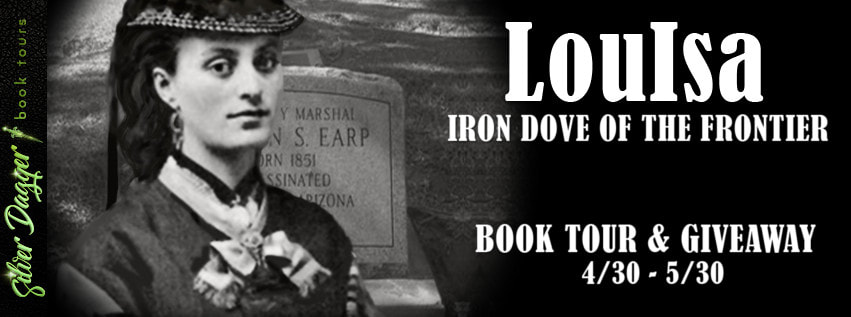
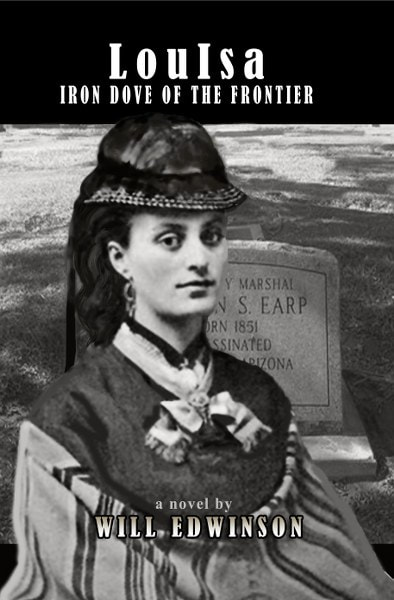

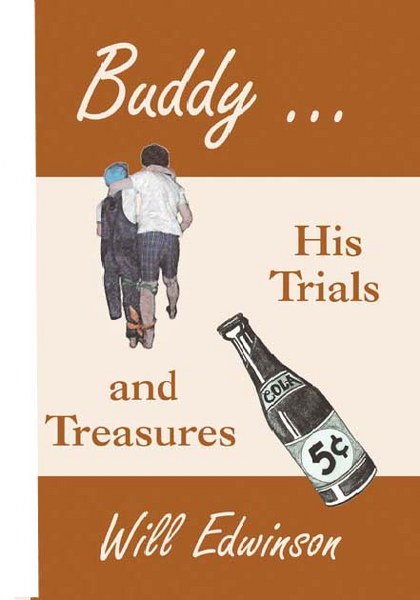



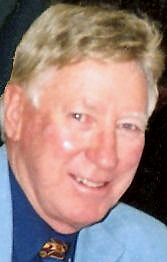

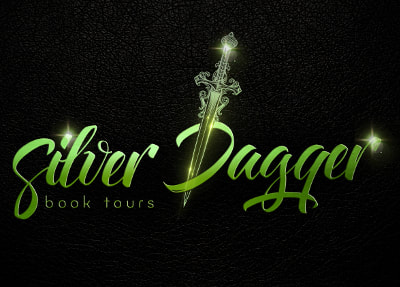
Comments
Post a Comment